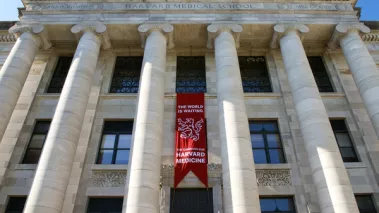Table of Contents
Report: Harvard Law School administrator canceled 2015 event on dissent in China

ThePhotosite / Shutterstock.com
Today, The Harvard Crimson released an in-depth piece detailing Harvard University’s relationship with China against the backdrop of the complicated U.S.-China relations. The entire piece is worth a read — especially its troubling account from Chinese dissident and human rights lawyer Teng Biao.
Just over five years ago, Teng says, a “powerful person” at Harvard Law School told him to postpone an event that could harm the institution’s relationship with China.
Teng was a visiting fellow at Harvard Law School in 2015; he had accepted a position there as part of the Scholars at Risk program. Teng’s criticisms of the Chinese Communist Party made him a target for harassment from China’s government and he felt unsafe returning to mainland China.
The Crimson reports that in early 2015, Teng had been working to schedule an event at Harvard to discuss human rights in China with fellow dissident Chen Guangcheng, but the plans quickly went sideways because the timing coincided with then-Harvard president Drew Faust’s trip to Beijing.
[O]n Feb. 11, the powerful person at Harvard gave Teng the first call.
“He told me to cancel the talk,” Teng says. “He told me the time we were supposed to give our talk, that day was when the Harvard president would fly back from Beijing. And a few weeks before that, the Harvard president was meeting Xi Jinping.” The administrator told him hosting an event with two Chinese dissidents only days after a historic meeting between Chinese President Xi Jinping and then University President Drew G. Faust would “embarrass” Harvard, Teng recalls.
“It was not about the title or the topics — but because of ourselves,” Teng says. “We ourselves are sensitive.”
Teng and the other organizers persisted, hoping they could find another Harvard venue. “We tried to avoid him, but eventually we realized we were not able to,” he says.
The second phone call, on March 10, was a formal and final warning. The powerful person called Teng to his office and told him the event would embarrass the University and potentially threaten the continuation of collaborative programs and joint research with China. The administrator asked Teng to “postpone” the event, and Teng finally agreed.
Chen Guangcheng told The Crimson that the postponement was not temporary: “It was just another way to cancel it completely.”
The report also states that Teng was asked to promise not to speak about the cancellation.
Though Teng did not reveal the name of the “powerful person” due to “fears of potential employment retaliation,” The Crimson reports that he was Harvard Law School Vice Dean for International Legal Studies William P. Alford — who admits he interfered.
However, sources familiar with the incident speaking under the condition of anonymity confirmed that that person was Professor William P. Alford, Harvard Law School’s Vice Dean for International Legal Studies. Throughout his career, Alford has met with current and past presidents of China and Taiwan and spoken at the Central Party School of the Chinese Communist Party.
“Having for years served on the Scholars at Risk Committee and for decades hosted a broad range of scholars and law related activists from China at HLS, I tried to make Dr. Teng’s time here academically fruitful,” Alford wrote in an emailed statement. “I invited him to speak in my class around the time in question, introduced him to colleagues and met with him frequently about his research, his plans, and his family. I did ask that he schedule the event in question after our University President had left Beijing.”
As The Crimson explains, it’s possible that Teng “was the victim of a one-time exception at Harvard,” and that the public may never know what behind-the-scenes decisions led Alford to call Teng. Maybe the Chinese government requested the cancellation. Maybe no request was made, but administrators felt cancellation would be prudent.
However, we do know this: Such interference in academic events is unacceptable.
As FIRE has written time and time again, U.S. institutions’ relationships with China — whether friendly or sour — should not determine what speech is allowed on campuses. That includes speech on U.S. campuses, satellite American campuses in China, and speech from Chinese students and scholars in the United States, too.
Universities like Harvard (which, after all, promises free expression and academic freedom) fundamentally abandon their mission if they choose to censor political debate to appease a government with which they wish to establish or maintain ties. And make no mistake: Moving back the date of an event to a more politically-convenient time isn’t much better than canceling it outright.
American universities enter situations of great moral hazard when they become involved with authoritarian regimes, and all too often, they are not handling it well. Harvard owes its community a candid explanation of how this cancellation occurred, and a promise that it will not apply similar pressure in the future.
Recent Articles
FIRE’s award-winning Newsdesk covers the free speech news you need to stay informed.

Free Speech Forum empowers next generation of First Amendment heroes

Supreme Court case upholding age-verification for online adult content newly references 'partially protected speech,' gives it lesser First Amendment scrutiny

All that glitters is not gold: A brief history of efforts to rebrand social media censorship
